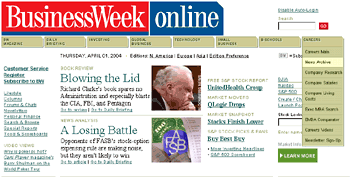TheDeal.com executive editor Yvette Kantrow wonders about the effects of blogging on business journalism in the aftermath of a decision by Business 2.0 that it will encourage all of its writers to blog, and that they will be paid based on how many hits they receive.

“None of this is that far-fetched. In fact, we’ve already seen a bevy of business Web sites wander off their parents’ farms in search of new eyeballs. Forbes.com, for example, scored a truckload of links to mass-market Web sites in August by posting a provocative article urging men to steer clear of marrying career women or risk living in a dirty house. Way to go, Capitalist Tool! And BusinessWeek Online, the new home of former Forbes.com ‘lifestyle editor’ Charles Dubow, is running ‘slideshows’ on such un-businesslike topics as the ‘Coolest Cop Cars,’ ‘Super Bathrooms,’ and our personal favorite, ‘Super Doghouses.’ ‘From the canine avant-garde to the miniature mutt mansion, this BusinessWeek.com slideshow gives dogs and owners alike something to drool over,’ it coos.
“But are those droolers really BusinessWeek readers? Will they return to the Web site day after day and read its other, more business-y fare? Or are they just passing through on their way to DogChannel.com? Perhaps only time will tell if all eyeballs are good ones and if splashy, less-specialized Web content, whether via blogs, slide shows or whatever, can attract the kind of high-powered, high-income readers magazines such as BusinessWeek and Business 2.0 purport to deliver to advertisers. In his Huff Po piece, Shanoff laments that Business 2.0’s plan will divert its journalists’ attention ‘from the quality of their writing to the quality of their traffic.’ But we’d argue that the quality of the traffic has yet to be taken into account. Right now, it’s all about the quantity.”
Read more here.
Reuters has named Colleen Jenkins as White House editor. She previously was a 2024 election editor and…
Ian Stevenson has been hired by E&E News to cover energy, including oil and gas and…
Bloomberg News is looking for a creative self-starter who can use data to help make…
Jim Pavia, a senior editor at CNBC, has left to become managing director of communications at…
Russell Sherman of "Press Profiles" interviewed Wall Street Journal mergers and acquisitions reporter Lauren Thomas about how she…
Rebecca Blumenstein, president of editorial at NBC News, sent out the following on Wednesday: All, I…
View Comments
Quantity vs. quality has always been the dilemma of journalist everywhere. Though the journalism shift has changed dramatically partly due to blogging, I believe that quality would still be the most important thing in a journalist's piece.
Great article. Businesses today use metrics to measure every aspect of their business. However, great data collecters they may be, but great understanders of data, not so sure. Journalists need to understand that every story may not have the impact in regards to click throughs and such. As a result of using this methodology as a means for performance reviewing, many stories that should be written (world peace, humanitarian efforts, etc) will be pushed aside for more e-Hollwood style journalism.